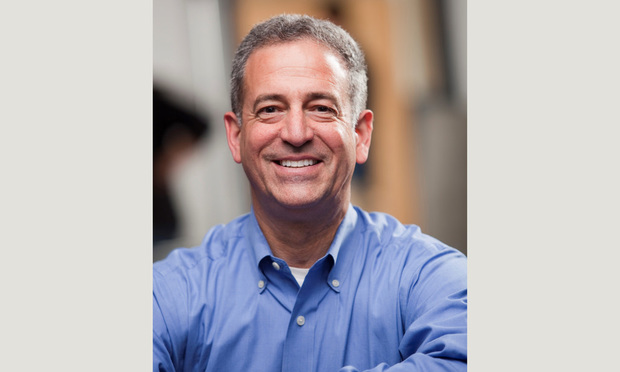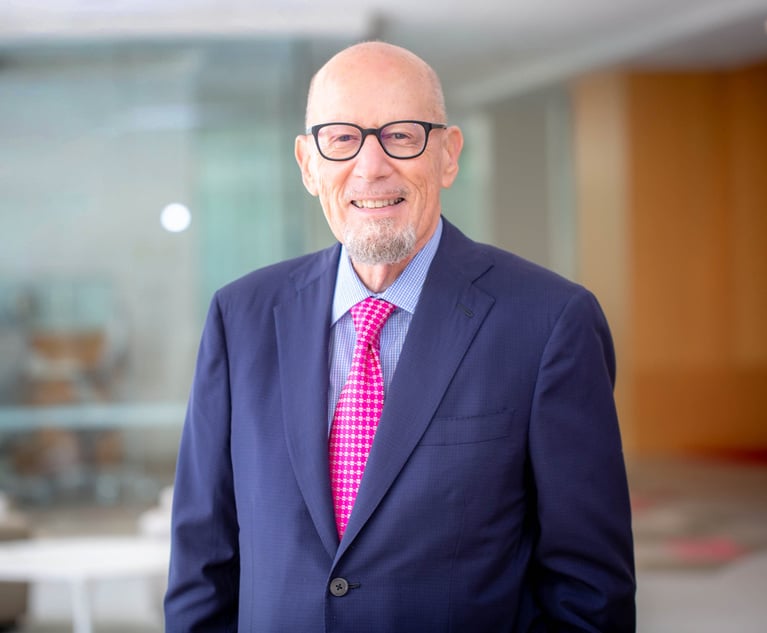Russ Feingold Takes the Helm at the American Constitution Society
The former Democratic senator discusses his vision for the ACS as the group's newest president, the importance of the rule of law and diversity on the bench.
March 22, 2020 at 10:00 AM
6 minute read
 American Constitution Society President Russ Feingold.
American Constitution Society President Russ Feingold.
Liberal groups are eyeing a Democratic presidential win in 2020 as their chance to answer the conservative judicial machine. At the American Constitution Society, they're preparing for that possibility with the selection of former Democratic Sen. Russ Feingold as the group's newest president.
Feingold recently spoke with The National Law Journal about his vision for ACS, the importance of the rule of law, and how he'll address diversity within the legal profession and on the bench.
What did you pitch as your vision for ACS and how you generally think liberals should be addressing and prioritizing the judiciary?
This is a time for every American who is concerned about the rule of law and our system of government to get involved in whatever way they can. That applies with particular force to progressives, and to progressive lawyers or progressives in other parts of the legal system.
There is an opportunity in the midst of all this trouble to rally people together for the integrity of the legal system, and I feel ACS is particularly well-positioned to do this. I think that is somewhat a broader notion than maybe some people associate with ACS at this point, although all of the elements are certainly there.
Taking this position under President Barack Obama may have felt different. It certainly feels urgent now. There's an awful lot of rebuilding that has to be done, but also proactive work.
How are you planning on tying your past work in the Senate, including on the Judiciary Committee, into your work for ACS? Will judicial nominees be a priority?
I'm really fortunate that my career has allowed me to be involved in just about every angle that ACS is involved in. I can bring some of the experiences I had in the Senate, including very direct involvement in four U.S. Supreme Court nomination processes. I can help figure out a way to undo, in effect, this right-wing packing of the courts, because that's what has happened.
We also have to be ready for whatever might happen in November, which is two different scenarios in terms of the judiciary. We have to have an understanding of what we're going to accomplish in either event.
Conservatives have been able to make the judiciary a major issue for their voters. Why do you think those on the left haven't been able to achieve the same level of success?
We have respect for the legal system. We don't think the legal system is a tool to get manipulated, or a number of very specific goals to achieve, like the obvious attempt to overturn Roe v. Wade. Everybody should have a fair chance and feel safe in front of the legal system. On the other hand, I do recognize that this is very challenging.
Are there any court reforms you would like to see be made a priority, by either the judiciary itself or through legislation?
I would like to see ACS help enhance a national conversation about the tenure of the judiciary. The founders of this country could not have possibly foreseen that people who are 35 to 40 years old could be on the court for 50 to 60 years.
There are legislative ways to enact reforms that may require constitutional amendments. Perhaps it can be done in other ways. But we have to get to the first level of recognizing as a country that there's something very odd about the way the third branch works.
There have been calls for increased diversity within the legal profession. How will you, a straight, white man who has been tapped to lead ACS, prioritize diversity?
Obviously, I am who I am, and that's not going to change. Unlike many conservative groups, ACS is on the side of making sure there is diversity in the court, in law firms, on law faculty, among student bodies and in membership of the ACS chapters.
It's an honor to be able to work on these issues. This is not the agenda of the right, they don't care about this. We do. It has always been my belief that the infusions of diverse people over time into this country, different people from different cultures—this is our greatest strength. And it needs to be reflected in the legal system in every way, shape and form.
The Judicial Conference is weighing a rule that would block federal judges from belonging to the ACS or the Federalist Society. Do you agree with the proposed rule? Do you think judges should not be involved in activities that can give even the impression of bias?
ACS is very concerned about there not being any conflict of interest at any point in the judicial system, and that clearly is the motivation behind the proposed rule.
On the other hand, we feel strongly that judges should be allowed to participate in events and conversations with groups like ACS. It helps the legal system, and it's also very beneficial to the judges. How that balance works out, we'll see.
You've spent the past few years teaching law students at Stanford, Yale, Harvard and Marquette. What have you learned from that experience and how will you fold it into your leadership of ACS?
I've learned a lot, and I've primarily learned it through informal conversations over the last 10 years with students who come to my office hours. Especially since 2016, young, progressive, bright students say to me, "I was interested in going to the State Department, going to the Justice Department after I graduated, but I can't really justify going there given the current administration." It seems to me there's a need for much greater interaction between ACS and people like that, who are drawn to be in public service. I intend to gradually do a nationwide tour of as many chapters as I can, to make sure this is grounded in those who are the future of the progressive legal coalition.
This content has been archived. It is available through our partners, LexisNexis® and Bloomberg Law.
To view this content, please continue to their sites.
Not a Lexis Subscriber?
Subscribe Now
Not a Bloomberg Law Subscriber?
Subscribe Now
NOT FOR REPRINT
© 2025 ALM Global, LLC, All Rights Reserved. Request academic re-use from www.copyright.com. All other uses, submit a request to [email protected]. For more information visit Asset & Logo Licensing.
You Might Like
View All
Cozen O'Connor's Bernard Nash Pioneered the Modern State AGs Practice. Now He's Hanging Up His Boots
6 minute read
US Patent Innovators Can Look to International Trade Commission Enforcement for Protection, IP Lawyers Say

Zuckerman Spaeder Gets Ready to Move Offices in DC, Deploy AI Tools in 2025
5 minute read
Outgoing USPTO Director Kathi Vidal: ‘We All Want the Country to Be in a Better Place’
19 minute readTrending Stories
- 1Conversation Catalyst: Transforming Professional Advancement Through Strategic Dialogue
- 2Trump Taps McKinsey CLO Pierre Gentin for Commerce Department GC
- 3Critical Mass With Law.com's Amanda Bronstad: 700+ Residents Near Ohio Derailment File New Suit, Is the FAA to Blame For Last Month's Air Disasters?
- 4Law Journal Column on Marital Residence Sales in Pending Divorces Puts 'Misplaced' Reliance on Two Cases
- 5A Message to the Community: Meeting the Moment in 2025
Who Got The Work
J. Brugh Lower of Gibbons has entered an appearance for industrial equipment supplier Devco Corporation in a pending trademark infringement lawsuit. The suit, accusing the defendant of selling knock-off Graco products, was filed Dec. 18 in New Jersey District Court by Rivkin Radler on behalf of Graco Inc. and Graco Minnesota. The case, assigned to U.S. District Judge Zahid N. Quraishi, is 3:24-cv-11294, Graco Inc. et al v. Devco Corporation.
Who Got The Work
Rebecca Maller-Stein and Kent A. Yalowitz of Arnold & Porter Kaye Scholer have entered their appearances for Hanaco Venture Capital and its executives, Lior Prosor and David Frankel, in a pending securities lawsuit. The action, filed on Dec. 24 in New York Southern District Court by Zell, Aron & Co. on behalf of Goldeneye Advisors, accuses the defendants of negligently and fraudulently managing the plaintiff's $1 million investment. The case, assigned to U.S. District Judge Vernon S. Broderick, is 1:24-cv-09918, Goldeneye Advisors, LLC v. Hanaco Venture Capital, Ltd. et al.
Who Got The Work
Attorneys from A&O Shearman has stepped in as defense counsel for Toronto-Dominion Bank and other defendants in a pending securities class action. The suit, filed Dec. 11 in New York Southern District Court by Bleichmar Fonti & Auld, accuses the defendants of concealing the bank's 'pervasive' deficiencies in regards to its compliance with the Bank Secrecy Act and the quality of its anti-money laundering controls. The case, assigned to U.S. District Judge Arun Subramanian, is 1:24-cv-09445, Gonzalez v. The Toronto-Dominion Bank et al.
Who Got The Work
Crown Castle International, a Pennsylvania company providing shared communications infrastructure, has turned to Luke D. Wolf of Gordon Rees Scully Mansukhani to fend off a pending breach-of-contract lawsuit. The court action, filed Nov. 25 in Michigan Eastern District Court by Hooper Hathaway PC on behalf of The Town Residences LLC, accuses Crown Castle of failing to transfer approximately $30,000 in utility payments from T-Mobile in breach of a roof-top lease and assignment agreement. The case, assigned to U.S. District Judge Susan K. Declercq, is 2:24-cv-13131, The Town Residences LLC v. T-Mobile US, Inc. et al.
Who Got The Work
Wilfred P. Coronato and Daniel M. Schwartz of McCarter & English have stepped in as defense counsel to Electrolux Home Products Inc. in a pending product liability lawsuit. The court action, filed Nov. 26 in New York Eastern District Court by Poulos Lopiccolo PC and Nagel Rice LLP on behalf of David Stern, alleges that the defendant's refrigerators’ drawers and shelving repeatedly break and fall apart within months after purchase. The case, assigned to U.S. District Judge Joan M. Azrack, is 2:24-cv-08204, Stern v. Electrolux Home Products, Inc.
Featured Firms
Law Offices of Gary Martin Hays & Associates, P.C.
(470) 294-1674
Law Offices of Mark E. Salomone
(857) 444-6468
Smith & Hassler
(713) 739-1250








